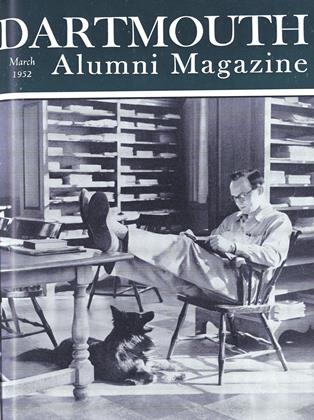WHEN this reaches you there will still be time to make last-minute arrangements to attend the annual meeting of the Dartmouth Society of Engineers to be held in New York on the evening of March 7. The exact time and place haven't yet been set, but we do know that President Dickey will be the honored guest speaker and that all alumni within striking distance of New York will want to be there. If you have mislaid the Society's mailing piece, call up RudyMiller '20 at 24 Bryant Avenue, White Plains, and he will add your name to the list and tell you when and where.
The Thayer School was represented by George Taylor, professor of engineering and management, Don Pyke, assistant professor of applied mechanics, and the writer at a College-Industry conference held at M.I.T. under the sponsorship of the American Society for Engineering Education on February 2. George was the official Dartmouth representative and I was a member of a panel which presented a discussion of "The Development of the Individual in the Engineering School." Representing the New Hampshire Ballbearing Company of Peterborough, N. H. was Ed Bergethon ME'48 who reports that he and Peggy and daughters Sondra and Kirsten are thoroughly enjoying'country life and are in the process of buying and moving into their own house.
Word has been received of the election of Theodore C. Lonnquest '18 the presidency of the American Society of Naval Engineers. Admiral Lonnquest is deputy and assistant chief of the Bureau of Aeronautics, Navy Department, in Washington, and is the first aeronautical engineer to be so honored in the 63-year history of the Society. During World War II he was responsible for the development and design of the Navy's aircraft and airborne equipment and received the Legion of Merit for his contributions in this capacity.
Bob Mcllwain TT'51 writes that he has been very happy in his work with the Budd Company but that the prospects for his staying there are negligible owing to the attitude his draft board is taking toward his eligibility for military service.
Boo Hayden '41 writes that he is still in charge of engineering for the Maryland-National Capitol Park and Planning Commission and is currently working on a special assignment to develop a Master Plan for the state of Maryland. He reports seeing JimO'Mara '43 frequently and comments that Jim and his partner are establishing a fine reputation by their work in that area.
The first news of Hart Smith '47 since he left Thayer School at the end of the war has been received. Hart was married in 1950 to Rita Hunt and they and their 9-months- old son Peter Charles live in Burlington, Ontario. Hart is a registered member of the Ontario Association of Professional Engi- neers and is Supervisor of Location Surveys in the Ontario Highway Department.
Phil Jackson '44 is the author of an article "Gantries Save Money on Concrete Prison Wall" which appeared in the January 31 issue of Engineering News Record. Phil is chief engineer of the Wexler Construction Company of Brookline, Mass., and from all indications ended up on the right side of the wall.
Ed Waring '47 visited the school recently as a representative of the Army Corps of Engineers describing opportunities for employment with the Corps.
A good letter from Roy Stifier '47 brings us up to date on his activities and where- abouts. Roy was married in December 1950 to Sylvia Schmutz of Ridgewood, N. J., and practically immediately thereafter the Marine Corps took him away from the Raymond Concrete Pile Company with whom he had been employed since graduation. He is at present assigned to the officer training program at Quantico where he is a first lieutenant and instructor, but he hopes to be back in civilian life by late spring.
Nick Costes CE'51 writes that he is enjoying both his graduate studies and his teaching activities at North Carolina State College. Nick's description of his first days as an instructor in surveying will make a good conclusion to this column: "As far as the Field Surveying is concerned, can you imagine me during the first weeks trying to teach the ABC's of surveying with the old Grecian broken accent spiced with a slight Yankee flavor? Can you also imagine my audience, a bunch of Southerners, some of them old- timers with families and kids, trying to understand me? With faces full of doubt and suspicion, they kept asking me questions which complicated the issue more than they ought to because, although the questions were simple, the Southern drawl of those guys made the words sound really like Greek to me."
 View Full Issue
View Full Issue
More From This Issue
-
 Article
ArticleAround the World in Fifty Books
March 1952 By JOHN HURD '21 -
 Article
ArticleTelevision and Education
March 1952 By EDWARD LAMB '24 -
 Class Notes
Class Notes1918
March 1952 By ERNEST H. EARLEY, DONALD L. BARR, RICHARD P. WHITE -
 Class Notes
Class Notes1929
March 1952 By F. WILLIAM ANDRES, EDWIN C. CHINLUND, JACK D. GUNTHER -
 Article
ArticleThe Undergraduate Chair
March 1952 By Conrad S. Carstens '52 -
 Class Notes
Class Notes1923
March 1952 By TRUMAN T. METZEL, COLIN C. STEWART 3RD
William P. Kimball '29
-
 Article
ArticleThayer School
August 1943 By William P. Kimball '29 -
 Article
ArticleThayer School
August 1945 By William P. Kimball '29 -
 Article
ArticleThayer School
February 1951 By William P. Kimball '29 -
 Article
ArticleThayer School
November 1951 By William P. Kimball '29 -
 Article
ArticleThayer School
October 1954 By WILLIAM P. KIMBALL '29 -
 Article
ArticleThayer School
January 1955 By WILLIAM P. KIMBALL '29







